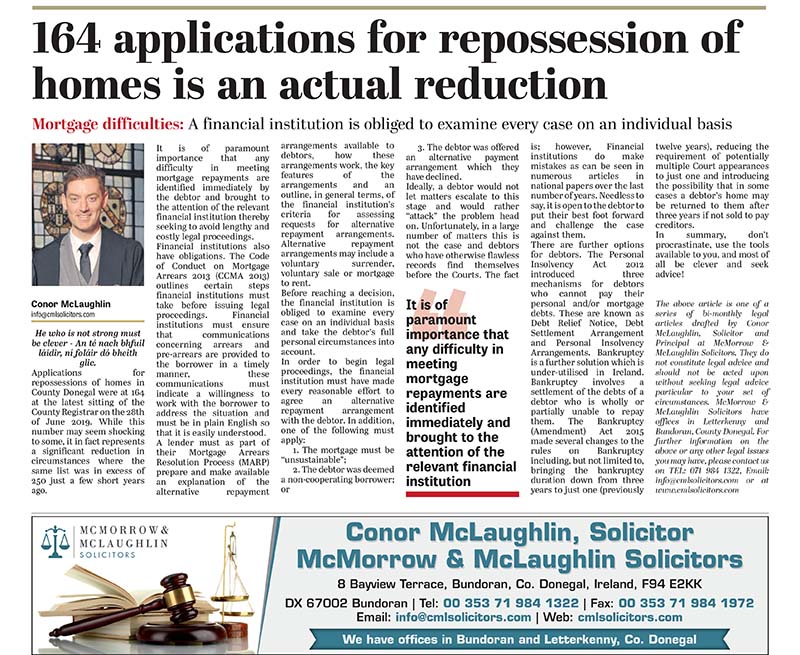
He who is not strong must be clever – An té nach bhfuil láidir, ní foláir dó bheith glic.
Applications for repossessions of homes in County Donegal were at 164 at the latest sitting of the County Registrar on the 28th of June 2019. While this number may seem shocking to some, it in fact represents a significant reduction in circumstances where the same list was in excess of 250 just a few short years ago.
It is of paramount importance that any difficulty in meeting mortgage repayments are identified immediately by the debtor and brought to the attention of the relevant financial institution thereby seeking to avoid lengthy and costly legal proceedings.
Financial institutions also have obligations. The Code of Conduct on Mortgage Arrears 2013 (CCMA 2013) outlines certain steps financial institutions must take before issuing legal proceedings. Financial institutions must ensure that communications concerning arrears and pre-arrears are provided to the borrower in a timely manner, these communications must indicate a willingness to work with the borrower to address the situation and must be in plain English so that it is easily understood.
A lender must as part of their Mortgage Arrears Resolution Process (MARP) prepare and make available an explanation of the alternative repayment arrangements available to debtors, how these arrangements work, the key features of the arrangements and an outline, in general terms, of the financial institution’s criteria for assessing requests for alternative repayment arrangements. Alternative repayment arrangements may include a voluntary surrender, voluntary sale or mortgage to rent.
Before reaching a decision, the financial institution is obliged to examine every case on an individual basis and take the debtor’s full personal circumstances into account.
In order to begin legal proceedings, the financial institution must have made every reasonable effort to agree an alternative repayment arrangement with the debtor. In addition, one of the following must apply:
- The mortgage must be “unsustainable”;
- The debtor was deemed a non-cooperating borrower; or
- The debtor was offered an alternative payment arrangement which they have declined.
Ideally, a debtor would not let matters escalate to this stage and would rather “attack” the problem head on. Unfortunately, in a large number of matters this is not the case and debtors who have otherwise flawless records find themselves before the Courts. The fact is; however, Financial institutions do make mistakes as can be seen in numerous articles in national papers over the last number of years. Needless to say, it is open to the debtor to put their best foot forward and challenge the case against them.
There are further options for debtors. The Personal Insolvency Act 2012 introduced three mechanisms for debtors who cannot pay their personal and/or mortgage debts. These are known as Debt Relief Notice, Debt Settlement Arrangement and Personal Insolvency Arrangements. Bankruptcy is a further solution which is under-utilised in Ireland. Bankruptcy involves a settlement of the debts of a debtor who is wholly or partially unable to repay them. The Bankruptcy (Amendment) Act 2015 made several changes to the rules on Bankruptcy including, but not limited to, bringing the bankruptcy duration down from three years to just one (previously twelve years), reducing the requirement of potentially multiple Court appearances to just one and introducing the possibility that in some cases a debtor’s home may be returned to them after three years if not sold to pay creditors.
In summary, don’t procrastinate, use the tools available to you, and most of all be clever and seek advice!
